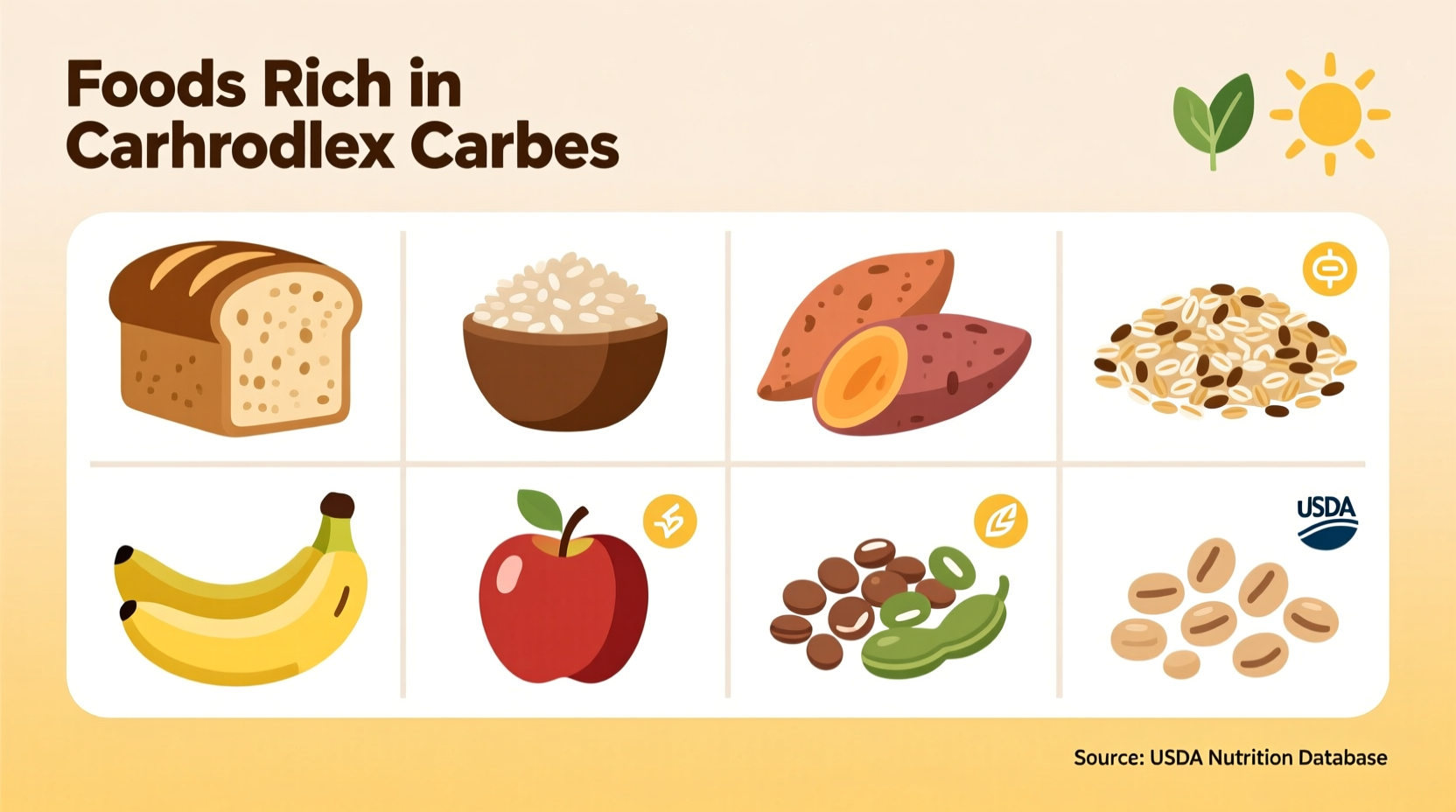Carbohydrate-rich foods include whole grains like oats and quinoa, starchy vegetables such as potatoes and corn, fruits including bananas and mangoes, legumes like beans and lentils, and dairy products such as milk and yogurt. These foods provide essential energy through complex and simple carbohydrates that support bodily functions and physical activity.
Understanding which foods deliver optimal carbohydrate nutrition is crucial for maintaining energy levels, supporting athletic performance, and managing overall health. This comprehensive guide identifies the most nutrient-dense carbohydrate sources while explaining their nutritional profiles and practical applications in daily eating patterns.
Why Carbohydrates Matter for Your Health
Carbohydrates serve as your body's primary energy source, fueling everything from brain function to physical activity. The Dietary Guidelines for Americans recommend that carbohydrates constitute 45-65% of your daily caloric intake, with emphasis on complex carbohydrates from whole food sources. Unlike processed carbs that cause blood sugar spikes, quality carbohydrate sources provide sustained energy alongside essential vitamins, minerals, and fiber.
Whole Grains: Sustained Energy Powerhouses
Whole grains maintain their complete nutritional profile because they contain all three parts of the grain kernel - bran, germ, and endosperm. This structural integrity delivers slower digestion and more stable blood sugar levels compared to refined grains.
Top whole grain choices include:
- Oats (½ cup cooked): 27g carbohydrates, 4g fiber
- Quinoa (½ cup cooked): 20g carbohydrates, 3g fiber
- Brown rice (½ cup cooked): 22g carbohydrates, 2g fiber
- Whole wheat bread (1 slice): 12g carbohydrates, 2g fiber
- Buckwheat (½ cup cooked): 21g carbohydrates, 5g fiber
| Whole Grain | Carbohydrates (per ½ cup) | Fiber Content | Glycemic Index |
|---|---|---|---|
| Oats | 27g | 4g | 55 |
| Quinoa | 20g | 3g | 53 |
| Brown Rice | 22g | 2g | 68 |
| Buckwheat | 21g | 5g | 47 |
This nutritional comparison, based on USDA FoodData Central data, reveals how different whole grains offer varying carbohydrate profiles. Buckwheat's lower glycemic index makes it particularly valuable for blood sugar management, while oats provide exceptional soluble fiber content that supports heart health.
Fruits: Nature's Sweet Energy Packages
Fruits deliver carbohydrates alongside essential vitamins, antioxidants, and natural sugars that provide quick energy. While some fruits contain more carbohydrates than others, all contribute valuable nutrients to your diet.
High-carbohydrate fruit options:
- Bananas (medium): 27g carbohydrates
- Mangoes (1 cup): 25g carbohydrates
- Grapes (1 cup): 27g carbohydrates
- Apples (medium): 25g carbohydrates
- Dates (2 pieces): 36g carbohydrates
According to research published in the American Journal of Clinical Nutrition, fruit consumption correlates with improved metabolic health despite their sugar content, thanks to their fiber and phytochemical composition.
Starchy Vegetables: Nutrient-Dense Carb Sources
Starchy vegetables often get overlooked as valuable carbohydrate sources, yet they provide complex carbs alongside essential nutrients. Unlike refined carbohydrates, these vegetables deliver fiber, vitamins, and minerals that support overall health.
Top starchy vegetable choices:
- Sweet potatoes (1 medium): 24g carbohydrates, 4g fiber
- Regular potatoes (1 medium): 37g carbohydrates, 3g fiber
- Corn (½ cup): 15g carbohydrates, 2g fiber
- Peas (½ cup): 11g carbohydrates, 4g fiber
- Winter squash (½ cup): 10g carbohydrates, 2g fiber
The Centers for Disease Control and Prevention emphasizes that starchy vegetables should be part of a balanced diet, noting their potassium content supports healthy blood pressure levels.

Legumes: Protein-Carbohydrate Power Combos
Beans, lentils, and peas offer an exceptional combination of carbohydrates and plant-based protein, making them valuable for both energy and muscle maintenance. Their high fiber content promotes satiety and digestive health.
Nutrient-dense legume options:
- Black beans (½ cup): 20g carbohydrates, 8g protein, 7g fiber
- Lentils (½ cup): 20g carbohydrates, 9g protein, 8g fiber
- Chickpeas (½ cup): 30g carbohydrates, 7g protein, 6g fiber
- Kidney beans (½ cup): 20g carbohydrates, 8g protein, 6g fiber
Contextual Considerations for Carbohydrate Consumption
Understanding when and how to incorporate carbohydrate-rich foods requires considering individual factors that influence nutritional needs:
- Athletes and active individuals benefit from higher carbohydrate intake before, during, and after exercise to maintain performance and support recovery
- People with diabetes should focus on complex carbohydrates with lower glycemic impact and pair carbs with protein and healthy fats
- Weight management approaches work best when emphasizing high-fiber carbohydrate sources that promote satiety
- Digestive health concerns may require adjusting types of carbohydrates, particularly FODMAP content
The American College of Sports Medicine recommends 3-5 grams of carbohydrates per kilogram of body weight daily for moderate exercisers, increasing to 6-10 grams for endurance athletes. These guidelines demonstrate how carbohydrate needs vary significantly based on activity level and health status.
Practical Integration Strategies
Transforming this knowledge into daily eating habits requires thoughtful planning:
- Replace refined grains with whole grain alternatives in your favorite recipes
- Pair carbohydrate sources with protein and healthy fats to moderate blood sugar response
- Time higher-carbohydrate meals around physical activity for optimal energy utilization
- Experiment with different grain varieties to discover new flavors and textures
- Include a variety of colorful fruits and vegetables to maximize nutrient diversity
Registered dietitians often recommend the plate method for balanced meals: fill half your plate with non-starchy vegetables, one-quarter with lean protein, and one-quarter with carbohydrate-rich foods. This simple visual guide helps maintain appropriate carbohydrate portions while ensuring nutritional balance.
Common Misconceptions About Carbohydrates
Despite their essential role in human nutrition, carbohydrates face unnecessary criticism. Research from the Harvard T.H. Chan School of Public Health clarifies several misconceptions:
- "All carbs are bad" - Quality matters significantly; whole food carbohydrate sources provide essential nutrients
- "Carbs make you fat" - Excess calories from any source contribute to weight gain, not carbohydrates specifically
- "You should eliminate carbs" - The human body requires carbohydrates for optimal brain and muscle function
- "Low-carb diets are best for everyone" - Individual responses to carbohydrate intake vary significantly based on genetics and activity level
Understanding these distinctions helps create sustainable eating patterns that support long-term health rather than following restrictive dietary trends.
Building Balanced Meals with Quality Carbohydrates
Creating satisfying, nutritionally balanced meals with carbohydrate-rich foods involves strategic combinations that maximize both flavor and nutritional value:
- Combine quinoa with black beans, roasted vegetables, and avocado for complete protein and balanced macronutrients
- Add berries to oatmeal with nuts for sustained morning energy
- Create grain bowls with brown rice, steamed edamame, and colorful vegetables
- Pair sweet potatoes with lean protein and leafy greens for a nutrient-dense dinner
- Use whole wheat pasta with tomato-based sauces and added vegetables for a satisfying meal
These combinations demonstrate how carbohydrate-rich foods serve as the foundation for meals that provide sustained energy, promote satiety, and deliver comprehensive nutrition.
Conclusion: Embracing Carbohydrates for Optimal Health
Carbohydrate-rich foods form an essential component of a balanced, nutritious diet when selected from whole food sources. By understanding the nutritional profiles of different carbohydrate options and how they fit into your individual health needs, you can make informed choices that support your energy levels, athletic performance, and overall well-being. Focus on quality over quantity, prioritize whole food sources, and enjoy the diverse flavors and textures that carbohydrate-rich foods bring to your table.











 浙公网安备
33010002000092号
浙公网安备
33010002000092号 浙B2-20120091-4
浙B2-20120091-4